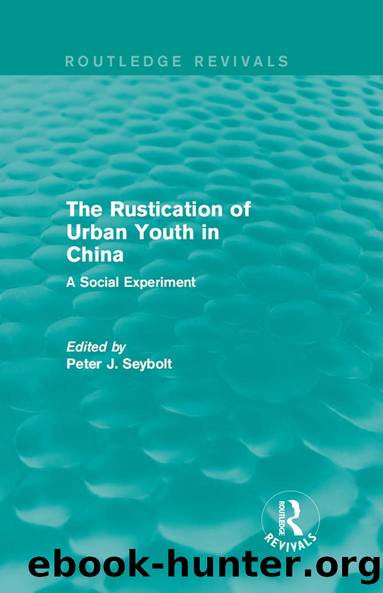The Rustication of Urban Youth in China by Peter J. Seybolt

Author:Peter J. Seybolt [Seybolt, Peter J.]
Language: eng
Format: epub
ISBN: 9781138191792
Barnesnoble:
Publisher: Taylor & Francis
Published: 2016-01-05T00:00:00+00:00
*Shang-hai shih Nan-ching tung lu Kuei-chou li-nung pâei-ho nung-tsâun kao-hao tsai-chiao-yü. âKâung-ku ho fa-chan chih-shih châing-nien shang-shan hsia-hsiang ti wei-ta châeng-kuo.â
9
Important Content of the Revolution in Education
Yenan Middle School Party Branch, Tientsin*
Among the students whom our school has graduated since 1968, more than thirteen hundred have gone to the villages and border regions to join the brigades and make a home. There they have been tempered and matured in the Three Great Revolutionary Movements in the villages. Not a few have become members of the Chinese Communist Party and the Communist Youth League. Many have joined the leadership ranks on varying levels or have undertaken technical work and have become very useful in the struggle to construct new socialist villages. These rich results have greatly encouraged the schoolâs students, teachers and revolutionary parents, making the Partyâs educational policies enter their hearts more deeply, and making the idea that agricultural work is glorious pass from class to class. We have come to understand through practice that the school must regard coordination with the villages in reeducating students who have gone to the countryside as an important aspect of the educational revolution.
In 1968 our great leader Chairman Mao announced that âeducated youths must go to the countryside to be reeducated by the poor and lower-middle peasants.â The students in the âthree old classesâ (that is, the classes of â66, â67, and â68) found that after the tempering of the Proletarian Cultural Revolution, the great majority of them had achieved a profound understanding of the meaning of Chairman Maoâs directive. Resolved to carry it out, they went one after another to the villages. Under these circumstances, some of the teachers said, âOnce weâve seen the students out the door, our responsibilities are over. Their tempering is their own responsibility, no need for us to worry.â Although the Party branch felt that this viewpoint was not quite right, it still did not pay enough attention to it. After a period of time, we heard that some of the students had met with some difficulties in the villages and were vacillating in their thought; and some individual students had also done some wrong things. At that time the whole school was discussing it, and not a few teachers held that we ought to form bonds with the villages and coordinate with the work of the poor and lower-middle peasants in ideological education; on the other hand, some people also held that the school is the agency that sends people, it is in charge of mobilization, and it is the poor and lower-middle peasantsâ business to educate them after they have reached the countryside; it is not necessary to be concerned with so many things.
Should we concern ourselves with this ? Is it after all an âexternalâ or an âinternalâ matter ? Considering this question, we organized all the teachers to study conscientiously the Party directive on education, study the discussions of Chairman Mao relating to the cultivation of successors to the proletarian revolutionary cause, and
Download
This site does not store any files on its server. We only index and link to content provided by other sites. Please contact the content providers to delete copyright contents if any and email us, we'll remove relevant links or contents immediately.
Spell It Out by David Crystal(36016)
Life for Me Ain't Been No Crystal Stair by Susan Sheehan(35715)
Cecilia; Or, Memoirs of an Heiress — Volume 1 by Fanny Burney(32402)
Cecilia; Or, Memoirs of an Heiress — Volume 3 by Fanny Burney(31796)
Cecilia; Or, Memoirs of an Heiress — Volume 2 by Fanny Burney(31769)
The Great Music City by Andrea Baker(31237)
Professional Troublemaker by Luvvie Ajayi Jones(29565)
We're Going to Need More Wine by Gabrielle Union(18935)
The Secret History by Donna Tartt(18795)
Twilight of the Idols With the Antichrist and Ecce Homo by Friedrich Nietzsche(18472)
All the Missing Girls by Megan Miranda(15461)
Cat's cradle by Kurt Vonnegut(15135)
Pimp by Iceberg Slim(14286)
Bombshells: Glamour Girls of a Lifetime by Sullivan Steve(13946)
Talking to Strangers by Malcolm Gladwell(13170)
Norse Mythology by Gaiman Neil(13160)
Fifty Shades Freed by E L James(13140)
For the Love of Europe by Rick Steves(12537)
The Social Justice Warrior Handbook by Lisa De Pasquale(12111)
